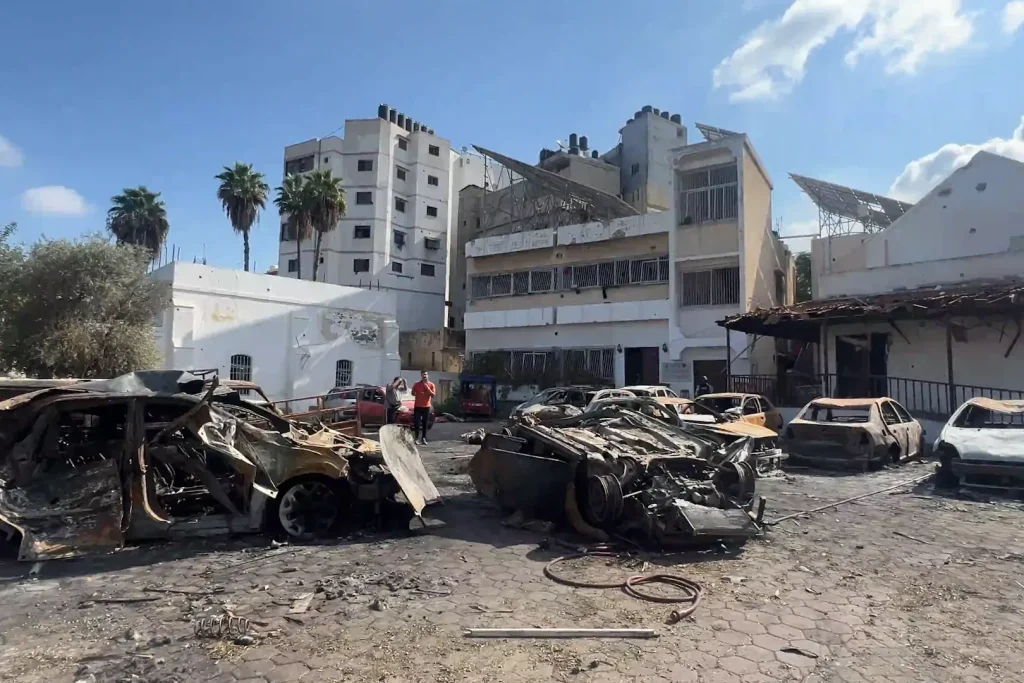The Gaza hospital fuel crisis is rapidly worsening, with dire warnings from medical professionals regarding the survival of critically ill infants. Hospitals like Nasser Hospital in Khan Younis are facing imminent shutdowns due to severe fuel shortages, jeopardizing the delicate lives of vulnerable newborns dependent on incubators and mechanical ventilation. Doctors report that without immediate fuel supplies, the electrical outages will likely lead to a spike in patient deaths in both intensive care and neonatal units. The ongoing humanitarian crisis in Gaza has left medical facilities grappling with shortages of essential supplies, compounding the risks for infants’ survival and the provision of critical care. As fuel stocks dwindle, the international community is urged to act swiftly to avert further disaster in Gaza hospitals, where the stakes couldn’t be higher.
The ongoing energy shortage in medical facilities across Gaza has reached a critical point, presenting significant challenges to patient care and safety. With local hospitals exhausting their fuel reserves, the implications for neonatal and intensive care services are alarming. Health care providers are encountering unprecedented dilemmas as they strive to ensure adequate medical attention amidst dwindling resources. The alarming situation has escalated into a broader humanitarian emergency, threatening the lives of countless infants reliant on constant medical support. Urgent action is needed to address the extreme shortages impacting hospital operations and to provide relief to those at risk.
The Humanitarian Crisis in Gaza’s Hospitals
The humanitarian crisis in Gaza has reached alarming levels, particularly in the medical sector. Hospitals are grappling with severe shortages of essential supplies, including fuel, which is critical for operating life-saving equipment. As the United Nations reports, hospitals like Nasser are on the brink of impending shutdown due to fuel shortages, exacerbating the already dire situation for patients, especially infants in critical care. With 18 out of 36 hospitals in Gaza providing only partial services or not operating at all, the pressure on healthcare facilities has intensified, leaving many patients vulnerable and exposed to health risks.
The crisis extends beyond mere fuel shortages. The lack of medical supplies, infant formula, and other essential goods leads to a compounding effect, endangering the survival of newborns and those requiring intensive care. Impossible decisions must be made by doctors, as they navigate a landscape where every minute counts. The healthcare professionals are facing moral dilemmas as they struggle to save lives while dealing with dwindling resources. This unrelenting crisis calls for immediate intervention from the international community to alleviate these shortages and provide essential support.
Frequently Asked Questions
What is the Gaza hospital fuel crisis and how does it affect medical care?
The Gaza hospital fuel crisis refers to the critical shortage of fuel in Gaza, which has led to severe limitations on hospital operations. With hospitals unable to maintain power, critical care for patients, particularly infants, is at risk as incubators and medical equipment may shut down due to lack of electricity. This crisis has escalated the humanitarian situation, jeopardizing the survival of many vulnerable patients in Gaza.
How is the fuel shortage impacting infants receiving critical care in Gaza hospitals?
Infants receiving critical care in Gaza hospitals, particularly in neonatal units, are facing life-threatening conditions due to the fuel shortage. As hospitals run low on diesel, the electricity needed to operate incubators and ventilators is being cut off, putting premature and sick babies at an increased risk of severe health deterioration or death. This issue highlights the dire medical shortages in Gaza.
What are the immediate consequences of the fuel crisis in Gaza hospitals?
The immediate consequences of the fuel crisis in Gaza hospitals include imminent shutdowns of facilities, which could result in increased patient mortality, particularly among those in intensive care and neonatal units. As hospitals can no longer operate essential services, many patients are left without the critical medical attention they need to survive.
How have hospitals in Gaza prepared for the fuel crisis and its effects on patient care?
Hospitals in Gaza have been forced to ration their remaining fuel reserves, leading to power cuts in non-essential departments while trying to keep critical care units operational. With supplies running critically low, medical staff are bracing for the inevitable consequences of a complete power loss, which will significantly hinder their ability to provide care and could lead to rising infant mortality rates.
What actions have been proposed to address the humanitarian crisis in Gaza related to fuel shortages?
In response to the humanitarian crisis in Gaza, calls have been made for the international community to intervene and facilitate the delivery of fuel and medical supplies to hospitals. Recently, an agreement was announced by European Union officials with Israel that may allow for increased aid, including food and fuel, to enter Gaza, potentially alleviating some of the pressing needs in local hospitals.
How long has the fuel ban been in place and what has been its impact on medical services in Gaza?
The fuel ban in Gaza has been enforced for approximately 130 days, leading to catastrophic impacts on medical services. None of the 36 hospitals in Gaza are fully operational; with many struggling to provide even partial care due to the lack of fuel and resources, this has resulted in severe medical shortages and has put lives at risk, especially for infants and critical patients.
What role do external actors play in resolving the Gaza hospital fuel crisis?
External actors, including international organizations and governments, play a crucial role in addressing the Gaza hospital fuel crisis. Their interventions, such as negotiating agreements for fuel deliveries and humanitarian aid, are vital in supporting the medical and humanitarian needs of the population, particularly vulnerable groups like infants who depend on critical care facilities.
| Key Point | Details |
|---|---|
| Critical Care Risks | Babies in Gaza face increased risk of illness and death as hospitals run out of fuel. |
| Hospital Status | Nasser Hospital and several others are on the brink of shutting down due to fuel shortages. |
| Past Incidents | There have been prior warnings where infants died from power shortages during military assaults. |
| Fuel Situation | Only 3,000 liters of diesel left at Nasser Hospital, needing 4,500 liters daily. |
| Operational Challenges | None of Gaza’s 36 hospitals are fully operational, with many providing limited services. |
| International Response | Calls for international intervention to supply fuel to hospitals have been made. |
| EU Agreement | The EU has reached an agreement with Israel for the entry of food and fuel into Gaza. |
Summary
The Gaza hospital fuel crisis poses a dire threat to the lives of critically ill babies, as essential medical services face imminent shutdown due to acute fuel shortages. With hospitals like Nasser Hospital nearing operational collapse, the healthcare system struggles to support the most vulnerable patients. Urgent international aid and interventions are critical to address this humanitarian crisis and restore vital medical services in Gaza.



